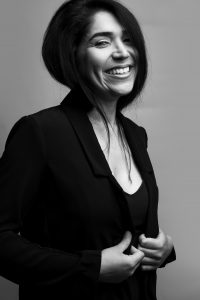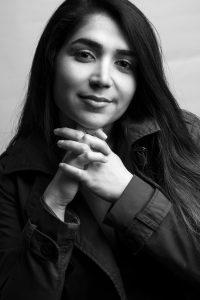“You said that the main focus of the interview will be professions being gender-neutral yet all the questions are about gender differences”, says Bengisu Yilmaz, a researcher at the Ultrasound Research Institute at Kaunas University of Technology (KTU) at the beginning of the interview. However, she soon admits that this is not new to her – a young researcher is getting used to sexist jokes, and to the fact that stereotypes to the local community are often more important than competences.
“In this sense, Turkey is more European”, admits Bengisu.
Bengisu Yilmaz, a PhD student at KTU, attained a degree in Mechatronics graduating from a private university in Istanbul. She was an active member of the gender awareness committee there.
“Our university implemented specific training programmes for teachers to prevent high school students from being influenced by gender stereotypes. It is extremely important in Turkey as only at the age of 18, after the national exam, a young person decides what to do next”, explains the young researcher.
You work as a junior project manager at the KTU Ultrasound Research Institute in Kaunas. Tell us more about your job.
I work on a project called “NDT on Air”. It is non-destructive “health monitoring” for airframe structures. My main responsibility is to test the bonding quality of the parts (i.e. properties of the glue), without disassembling the aeroplane. If we could improve bonding structures, we would reduce the weight of the aeroplane. Such a solution would be both environmentally friendly and cheaper.

The thing I love the most about my work is that it is interdisciplinary. For instance, I have a degree in mechatronics engineering, but on this project, I have been working as an electronics engineer. Also, I work closely with physicists, chemists and researchers form materials science.
Typically, engineering is perceived as a male-dominated field. What is masculine and feminine about your job?
A job is a job, no matter what you do. In every job, you can find things you like or you don’t like every day. It’s true when I was an undergraduate student, there were only three women out of fifty students. During master studies, the proportion was approximately 30 per cent women and 70 per cent men, and in PhD, I would say it’s half and half.
Maybe women are more diligent, eager to learn, that is why they become researchers?
No, I wouldn’t say that these things have anything to do with the gender. I wasn’t the best student, but here I am, studying PhD because I enjoy doing research.
What do you like about being a researcher?
The work I do is very diverse and varied – from data analysis to writing articles. It offers prospects for personal growth and development: we have to learn to write, to talk about the research, to speak in public, to prepare presentations. Also, we conduct experiments to prove new ideas.
To be a researcher, you must be curious. Maybe women are more curious? Oh no, I shouldn’t say that!
On a serious note, I like that at work I can apply my various skills and knowledge; for instance, I have taken art courses at the university, which helps me a lot now.
How does it help you?
Researchers need to know how to communicate about their work, they need to publish articles in journals. And the best way to communicate is through images. Understanding art is useful in science communication.
How did you decide to become an engineer?
During my first year at the university, I attended general courses as everyone else. Later, I chose some courses in industrial engineering, chemistry, physics, and arts. That’s when I realised that I enjoy creating something tangible.
My hobby is handicraft, and it is close to the engineers’ work.
Did your parents interfere with your choice? How did they react about it?
No, they didn’t interfere. When I was choosing my studies, my parents wanted me to study medicine, though I didn’t like hospitals, nor the environment, nor the smell. I respect people who do this noble work, but it’s not for everyone. Too much risk there – I knew I would be happier working with machines and arts.
In the beginning, I was thinking about political studies, but I realised that the amount of reading and writing that is needed is just not for me. On the other hand, I am becoming a doctor when I graduate from the PhD studies, maybe my parents will be happy about that!
However, you have mentioned that in the first years in university there were more girls than boys. What were the reasons?
I can’t answer for everyone. I chose what fuelled my curiosity and interest. This should be the main criteria for choosing the right study programme. If a girl wants to become a scientist, an engineer, to work with machines, she should pursue her interest.
The world is different than it was fifty years ago. There are a lot of different scholarships to promote diversity in science. Not only for women but for people with disabilities, the LGBT community. For example, The Marie Curie Foundation, which is funding my project, always includes a diversity dimension in the evaluation process.
What was the biggest challenge for you while studying?
Financial obligations! And this is nothing to do with gender – you must have some funds to be able to study and survive. I’m not from a rich family; I studied with a scholarship.
How would you encourage the girls who are considering choosing engineering, but are not sure if it’s the right choice for them?
I think they should try to find what they like. Science is much closer today than ever – there are many events, such as science fairs, science museums. After all, everyone has a computer – if a person is interested in what is happening behind the computer algorithms, that’s the first step.
Gender is not important; what matters is to discover what you like.
You mentioned crafts as your hobby. What are you making now?
I have just bought a thick notebook and started my travel journal. I write the impressions from my trips, make various collages. Working in “NDT on Air” project involves a lot of travelling – in the upcoming weeks, I will see two new countries for the first time.
What is the current situation with the gender balance in this job?
If you look at the numbers, the balance is almost 50/50, but if you look deeper, different perspective opens. The thing is that there are researchers of four different levels: junior researcher, research assistant, researcher and senior researcher, and only one woman is in a senior role.
However, I feel optimistic about the future. The women who are researchers or junior researchers today will grow up to senior roles.

How would the world benefit from more women in so-called hard sciences and leadership?
I would refine the question: I would like to talk not only about women but about LGBT people, international people, disabled people and so on. Diversity provides a broader perspective, an innovative approach to science and technologies. One perspective means a one-dimensional approach; different perspectives lead to a multi-dimensional image.
Sometimes we hear that a woman must be better than a man – more stubborn, hardworking, and smarter – to get to the same level of achievements. How do you feel about that?
I don’t think about it. My goal is to be better than yesterday, not to prove that I am better than a man. Overall, I don’t think people should compare themselves to each other. In fact, competing and comparing to each other is one of the greatest problems of PhD students.
What would you like to do after you graduate from your studies?
Never ask a PhD student about their plans! I am not sure whether I want to stay at the academy – I don’t like teaching. Maybe I would like to work in the industry, but it’s too early to talk about that.
Would you like to stay in Lithuania after graduation?
I don’t know. At any rate, it would be difficult to return home now as the current political situation is not favourable for researchers.
Lithuania has many great things to offer. First, nature. I can’t believe that I am saying this, but I even like the weather, especially winters with a lot of snow. However, I dislike sexist jokes in both social and work environment – people here tend to judge other people by their looks.
All in all, every country has its cons and pros and I will always be a foreigner, no matter where I go.
Is it important to you?
No, not really. For me, more important is the diversity and open-mindedness of the work environment.
Women in Tech – a project by the Kaunas University of Technology about women working in technology, engineering and innovation. The aim is to eliminate gender stereotypes linked to career choices and achievements in science.